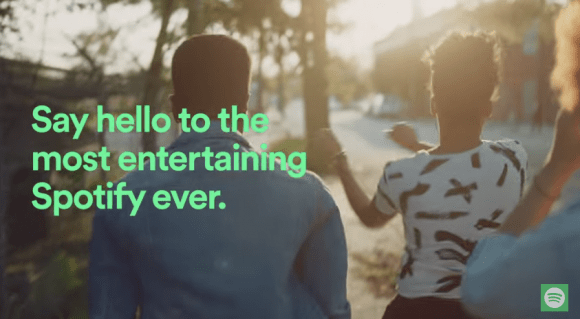
Spotify is on a roll after last night’s announcement, but reading between the lines it really makes the case for an artist-supported competitor like Tidal.
For those of you catching up on the announcement, The big news is that on top of streaming they’ll be bringing in podcasts as a new media type, as well as a new video capsule with a full alphabet of partners like ABC, BBC, ESPN, E!, TED, MTV, as well as more fleshed out names like Comedy Central, RadioLab, and Vice News.
The cool new thing for the tech world is how they’ve put their 2013 acquisition of Tunigo at the forefront of their platform, providing new mobile app experience that will intuitively know if you’re on your morning commute and suggest relevant music, or a running feature that attempts to match the music tempo with your running speed. These were the grand ideas behind Tunigo we found in our 2013 interview, finally come to life.
These are unique new features that help Spotify stand out before next month’s release of Apple’s streaming service and Spotify’s future IPO, but yesterday’s announcement made Jay Z and Tidal’s criticism and mission even more clear. Spotify is more than a music database, they’re cementing themselves as the only tastemakers on their platform, and therefore nudge and control where streaming revenues go.
At least it’s innovation?
Yesterday’s announcement is a major leap considering no real exciting features has come to the Spotify platform since it launched in 2008. Sure, you’ll remember their neutered attempt at an app store (that has now shuttered) and the social bar let’s you see what your friends are listening to in real time, but until now Spotify has been content with using the internet to serve content into a basic media player rather than reinventing a media player as an social or smart internet-first platform.
Despite Spotify’s (defensive) acquisition of radio algorithm company Echo Nest the company believes in a human approach, which is why they push their human curated playlists under their Browse section stronger than their radio features. But through their platform Jay Z’s gripes become more clear; Spotify is the new Billboard, the new ClearChannel Radio network setting the playlists from the top.
Take, for example, how difficult it is to find anyone other than Spotify’s playlists. Their UI buries any playlists built by your friends or the bands you follow, requiring real work to dig up anything interesting by randomly clicking through (and deep into) profiles on the social bar rather than highlighting any popular playlists from your feed.
On top of that try to find a decent playlist made by a stranger! Say someone out there made a great 90’s playlist you better hope they SEO’d it with the name “90’s college rock alternative” rather than giving it a creative name, like people have been doing with mixtapes or burned CDs since the beginning of recorded (music) history. Spotify isn’t a social platform -there’s no good way to find music on Spotify that the company isn’t curating.
It hasn’t always been this way. Tastemakers were around in Spotify’s app store (if you dug in to find them), with brands like Pitchfork and Rolling Stone providing an easy access to playlists and news. But there’s no sign that external tastemakers are coming back, looking at Spotify’s new list of partners which include no brands in the music space (especially if you count MTV).
Instead for original music and audio content Spotify is going for a full home-grown approach to music and shows – including stories of how artists bring their albums to life, plenty of programs about artists and food, or Amy Poehler’s Smart Girls, Dance Move of the Day. Compare that to instead bringing in Pitchfork, NPR Music, or any other brand in music taste.

I’ve been happily surprised by a few Spotify’s playlists and I’m sure these new video programs will be entertaining. But Jay Z and the rest of Tidal’s partners have picked up a lot of funny criticism for getting into the streaming space that I don’t understand. The timing is right to stage an attack from the artists’ perspective rather than handing our brave new world of curation and distribution to Spotify without question.




